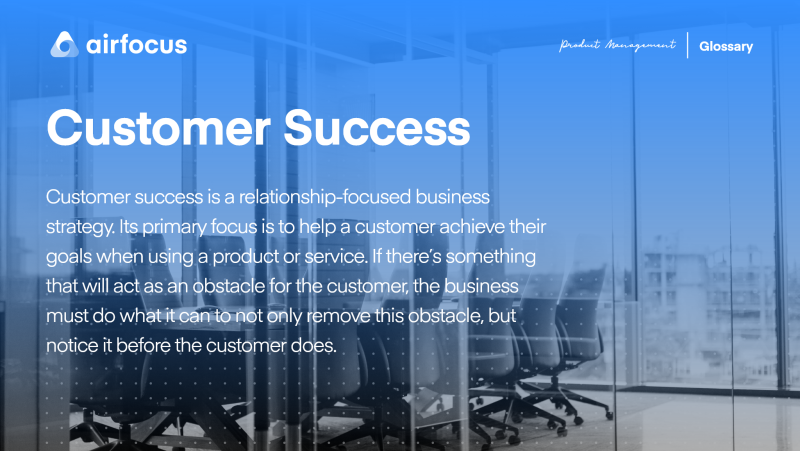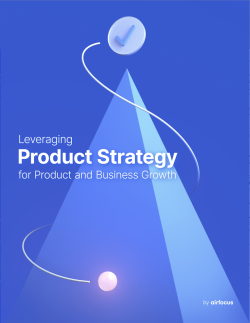Customer Success
What is customer success?
Definition of customer success
Customer success is a relationship-focused business strategy. Its primary focus is to help a customer achieve their goals when using a product or service. If there’s something that will act as an obstacle for the customer, the business must do what it can to not only remove this obstacle but notice it before the customer does.
Since the advent of the internet, the way we do business has evolved — and with it, the customer experience. Companies have become far more customer-centric, meaning things like long-term locked-in contracts and other archaic business practices are long gone.
Consumers have never had so much choice, which means businesses have had to find new ways to improve retention and reduce churn. After all, when another product is never more than a click away, any competitive advantage becomes essential.
It’s here that customer success comes in.
To offset record highs in the cost of customer acquisition, brands have become much more invested in the relationships they have with their customers. No longer do they simply want to sell the product and move on, but rather a brand will offer expanded services, up-sells, discounts, and many other additional services over and above the core transaction. Beyond that, they’ll provide anytime support from a dedicated representative who will genuinely listen to their concerns and pass on their feedback.
This one-on-one service is central to the customer success methodology. It’s about creating real customer happiness among a smaller group of loyal clients as opposed to focusing on larger volumes of high-churn clients.
Customer success and customer service are of course closely linked. But where customer service tends to happen reactively — that is, stepping in to fix a problem or answer a question as it arises — customer success tries to foresee any issues that could crop up, solving them before they do.
The benefits of customer success
Properly implemented, customer success changes the lens through which your clients see your business — and that brings with it a wealth of benefits.
Here are the headlines:
Streamlined user onboarding
With a customer success manager assigned to each new customer, you can ensure that they’re comfortable (and happy) every step of the way — leading to increased adoption. Likewise, a customer success manager can be instrumental in retaining a customer who is currently on a free trial by guiding them through the process, answering questions, and providing key support at an early stage.
Lower customer acquisition cost
Over time, running a customer success program will generate valuable insights into what works and what doesn’t. This will help you channel your sales and marketing in the right direction and reduce the cost of acquiring new customers.
Higher lifetime spend and lower churn
Customer success is, at its heart, about keeping your customer happy. A happy customer is less likely to leave. They’ll also spend more on the product over time, so your customer lifetime value goes up. That’s a win-win-win!
Enabling a feedback-driven development cycle
Part of the relationship formed between a customer and a customer success manager is an honest feedback loop. Because the relationship is one-on-one, CSMs are often privy to crucial feedback which — when used appropriately — can result in valuable changes to the product.
Which businesses benefit most from customer success?
If you work in a space that relies on longer-term customer relationships, customer success can be a highly effective way to achieve that.
To put it another way, if you’re tracking your customer lifetime spend as one of your key performance indicators, customer success will probably work for you.
Another aspect that affects whether or not customer success is a good fit is where your business is in its lifecycle. Generally speaking, companies who are looking to grow and scale rapidly will benefit greatly from the customer success methodology. Why? Because by focusing on the happiness and satisfaction of your customer, you’ll prevent them from churning and encourage them to spend more with the company.
And, of course, less churn and more spending are two of the essential ingredients for rapid growth.
The difference between customer success and customer service (in detail)
With similar names and positioning in a business, it’s understandable that customer success is regularly mistaken for customer service. Both are client-facing, and both are lines of direct communication.
In reality, however, the two are actually quite different. Here’s why:
Customer service is focused on the tactical and practical aspects of customer support. For example, a customer service agent may help a customer to reset their password, solve a particular error message, or handle a complaint.
Customer success is focused on the strategic and emotional aspects of customer support. The term ‘emotional’ may seem odd in this context, but businesses are all about people, and we’re emotional creatures through and through. The emotion that all customer success activities are geared toward? Happiness.
As we said previously: customer service tends to be reactive, whereas customer success is more proactive. And this is generally true, but this isn’t always the case.
No matter how hard you try, there will always be occasions when your customer isn’t happy and wants to take their problem from the customer service agent to the next level. Here, customer success managers play an important role in the escalation of issues.
A customer success manager can serve on the front line of that particular escalation path, hopefully defusing a complaint before it’s placed and — as is their remit — preventing a potential churn before it happens.

General FAQ

Glossary categories
Create effective product strategy

Experience the new way of doing product management








